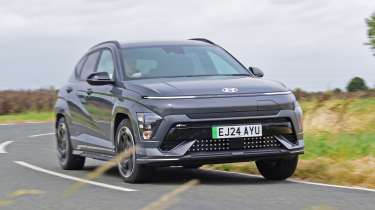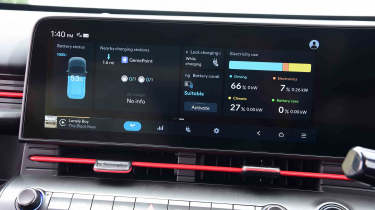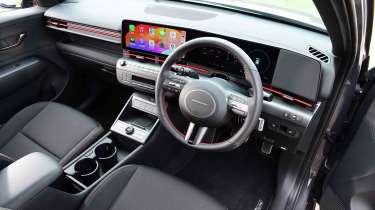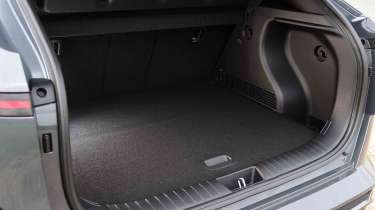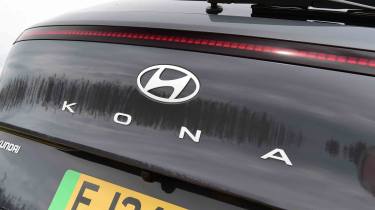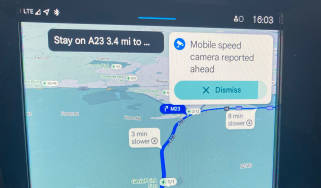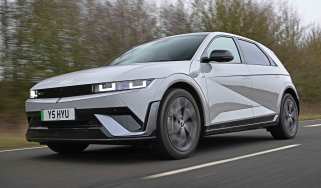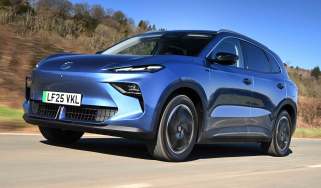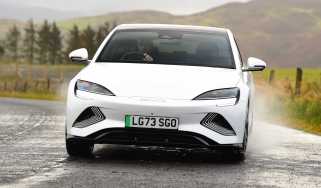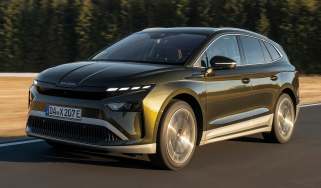Hyundai Kona Electric review
The Hyundai Kona Electric is one of the best small SUVs around and a previous Car of the Year winner

Is the Hyundai Kona Electric a good car?
The original Hyundai Kona Electric was good, but the second-generation model is even better. It’s larger, which means it’s more practical than many of its rivals, while a combination of plush materials and the latest tech make the interior feel more upmarket than before. The entry-level version with the smaller battery is temptingly affordable, while the larger battery offers up to 319 miles of range from a full charge. Small wonder we deemed it good enough to win the coveted Auto Express Car of the Year 2023 trophy.
|
Key specs | |
|
Fuel type |
Electric |
|
Body style |
Five-door SUV |
|
Powertrain |
48.4kWh battery, 1x e-motor front-wheel drive 65.5kWh battery, 1x e-motor front-wheel drive |
|
Safety |
Four-star Euro NCAP (2023) |
|
Warranty |
5yrs/unlimited mileage |
How much does the Hyundai Kona Electric cost?
The entry-level Hyundai Kona Electric costs a reasonable £35,000, but this is for a car in Advance trim and with the smallest 48.4kWh battery. Upgrading to the 65.4kWh battery adds £3,500 to the price. The 48.4kWh battery is available only with the Advance trim, so if you’re after the mid-range N Line or N Line S trims, or the high-spec Ultimate trim levels, you’ll need to buy a Kona Electric with a 65.4kWh battery. The prices range from around £40,500 to £43,000.
The Kona Electric comes with a generous level of equipment as standard, but there are a handful of optional extras available. These include metallic paint (£650), a two-tone roof on the N Line and N Line S models (£500) and full leather upholstery on the Ultimate trim (£900).
Used - available now
Lux packs are available on the N Line S and Ultimate trims and, depending on the model, include memory settings for the driver’s seat, digital key, remote park assist and a heated charging door.
Electric motor, performance & drive
With the smaller battery model there’s only 154bhp on offer, well down on the 215bhp the 65.4kWh battery version conjures up. Crucially though, the torque figures remain the same, so the lesser-power version is only a second slower to 62mph.
The torque delivery is as instant as you’d expect from an EV, and around town, the Kona has the grunt to feel very nippy. So grunty, in fact, that it’s easy to cause the front wheels to scramble for grip with too much throttle.
The Kona is bigger than before in every dimension, but its turning circle hasn’t increased, remaining at 10.6 metres. The steering is light, and you can easily turn the wheel with one finger – although we obviously wouldn’t recommend this on the road. That might be good for parking, but there’s virtually no feedback at higher speeds, meaning the Kona Electric isn’t a particularly exciting car to drive on a twisty B road.
|
Model |
Power |
0-62mph |
Top speed |
|
Kona Electric Advance 48.4kWh |
154bhp |
8.8 seconds |
101 mph |
|
Kona Electric N Line 65.4kWh |
215bhp |
7.8 seconds |
107 mph |
|
Kona Electric Ultimate 65.4kWh |
215bhp |
7.8 seconds |
107 mph |
We found the Kona Electric wasn’t quite as eager at motorway speeds, but should you need to overtake, there’s just enough punch to do so reasonably quickly. Even when you’re thrashing the Kona, its refinement remains excellent. There’s plenty of suspension travel to deal with cratered roads, but the suppleness doesn’t result in too much body lean in the corners. It’s a good balance with a clear focus on comfort.
The Advance comes on 17-inch wheels rather than the 19-inch rims found on the rest of the range, and we suspect these go some way to enhancing that impressive ride quality.
Range, charging & running costs
A 234-mile range from the smaller battery isn’t anything to shout about, especially given that the bigger battery dwarfs this with 319 miles. Unlike many of its rivals, though, the Kona will get near to that figure all year round thanks to a standard-fit heat pump, which is a more efficient way of heating the interior of a car in colder weather.
The peak 74kW charging figure for the 48.4kWh version means it’ll take 41 minutes to go from 10 to 80 per cent, while the 65.4kWh model has a higher 101kW charging speed that cuts the same 10 to 80 per cent top-up time to 34 minutes.
VED (road tax) is free until the 2025 rule changes, and it’s worth remembering that EV drivers can enter the London ULEZ area for free until 2025, too. However, it’s company car drivers who will see the biggest savings due to extremely low Benefit-in-Kind (BiK) taxation for electric vehicles when compared with regular petrol and diesel cars.
|
Model |
Battery size |
Range |
Insurance group |
|
Kona Electric Advance 48.4kWh |
48.4kWh |
234 miles |
25A |
|
Kona Electric Advance 65.4kWh |
65.4kWh |
319 miles |
31D |
|
Kona Electric Ultimate 65.4kWh |
65.4kWh |
319 miles |
33D |
Thanks to a group rating of 25 (out of 50), the Kona Electric in Advance trim with the 48.4kWh battery will be the cheapest to insure. Even the Ultimate trim with the 65.4kWh battery gets a group 33 rating, so insurance should be affordable across the range.
The Kona electric should hang on 51 per cent of its original purchase price after three years and 36,000 miles according to our expert data. That’s on par with the Kia EV3, and is considerably better than the Peugeot E-2008, which is only expected to retain 37 per cent of its value over the same period.
Design, interior & technology
Unlike the bigger battery Hyundai Kona, which comes in Advance, N Line, N Line S and range-topping Ultimate trim levels, the smaller battery car is only offered in Advance.
Don’t think the base-spec Kona Electric lacks equipment because there’s dual-zone climate control, front and rear parking sensors with a rear-view camera, Android Auto and Apple CarPlay connectivity, two USB-C ports up front and two in the rear. There are even the same twin 12.3-inch screens found in the higher specification Kona models.
There’s clear influence from the brand’s Ioniq range of cars with the Kona, not just with the pixelated lightbars and eye-catching angular design on the outside, but with the bright and airy interior, too. It’s a pleasant place to sit with plenty of room front and rear, and it certainly feels well screwed together.
Hyundai proudly states that the Kona’s interior is a result of customer feedback, which is usually reassuring. Yes, there are larger screens on the dash, which is customary for most EVs with premium aspirations, but we like the fact they’ve kept physical buttons for frequently-used functions like the radio and climate controls, making it easier to make quick adjustments while driving than in rivals that only use touchscreen-based controls.
Sat-nav, stereo and infotainment
The infotainment system is a doddle to use in the Kona and even the Advance version comes with sat-nav and EV route planning to help make sure you’re not scrambling to find a charger. Hyundai says over-the-air updates will be made available throughout the Kona’s lifespan, potentially including an ‘app shop’ to add more widgets and functionality to the menu.
Boot space, comfort & practicality
|
Dimensions | |
|
Length |
4,355mm |
|
Width |
1,825mm |
|
Height |
1,580mm |
|
Number of seats |
5 |
|
Boot space |
466-1,300 litres |
An increase in size means the second-generation Hyundai Kona Electric offers more interior space than the older version. You sit higher up and the car feels like it has a bit more presence about it; there’s more headroom, legroom and shoulder room than before.
The boot provides a handy 466 litres of luggage capacity, up from 374 litres in the old car, and the space increases to 1,300 litres with the rear seats folded down. There’s more space under the boot floor for storing the charging cables, and although the Kona Electric doesn’t have a proper ‘frunk’ under the bonnet, there’s enough space for a handbag or small shopping bag.
All versions come with Vehicle to Load (V2L) charging capability, which means you can power anything from a kettle to a microwave using the three-pin socket in the centre console.
Safety & reliability
The standard version of the second-generation Hyundai Kona was awarded a disappointing four-star safety rating when it was tested by safety experts Euro NCAP in 2023. A poor performance in the vulnerable road user protection test and the absence of driver assistance systems on low-spec models were behind the less-than-stellar rating for the Hyundai.
On the plus side, every Kona Electric is fitted with multiple airbags, a driver attention warning, forward collision avoidance assist, lane-keep assist, lane-follow assist, front and rear parking sensors, and a rearview camera.
N Line S and Ultimate models are also equipped with blind spot monitoring, rear cross-traffic collision avoidance assist, parking distance warning (side), safe exit warning and a surround view monitor, among other kit.
Hyundai finished a middling 17th out of 32 on the list of manufacturers in our recent 2024 Driver Power customer satisfaction survey, with the infotainment system given the biggest thumbs up. Owners were less satisfied with the cabin quality, ride and handling, and driving pleasure. The fact that Hyundai’s sibling brand Kia finished third suggests that there’s work to be done for Hyundai.
At least owners can rely on Hyundai’s excellent five-year unlimited mileage warranty. Although Kia offers cover for seven years, it’s worth noting that the mileage is capped at 100,000 miles.
|
Key standard safety features |
Euro NCAP safety ratings |
|
|
Hyundai Kona Electric alternatives
The Kona Electric is one of three EVs currently offered by Hyundai and, until the arrival of the Inster, its smallest SUV. There’s also a choice of petrol and hybrid power, if you’re not quite ready to take the leap into EV ownership.
Key rivals include the Kia Niro EV, which uses the same K3 platform as the Kona Electric, along with other electric small SUVs, such as the Peugeot E-2008, Vauxhall Mokka Electric and Volkswagen ID.3 and Cupra Born.
Frequently Asked Questions
The Hyundai Kona Electric comes with a five-year unlimited mileage warranty, which is better than many of its rivals.




